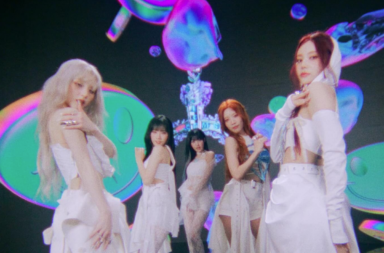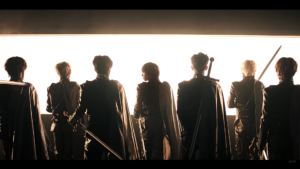
Our End-of-Year Reviews are in full swing, and fourth-generation groups like StayC, Stray Kids, and Oneus have already secured spots on our comebacks and MV lists. For this review, we turn our attention to their newest juniors, the class of 2021.
The number of debuting acts this year may be notedly modest, but their efforts are anything but. Editors Janine and Qing come together to discuss their robust performances and the revival of theatrical concepts.
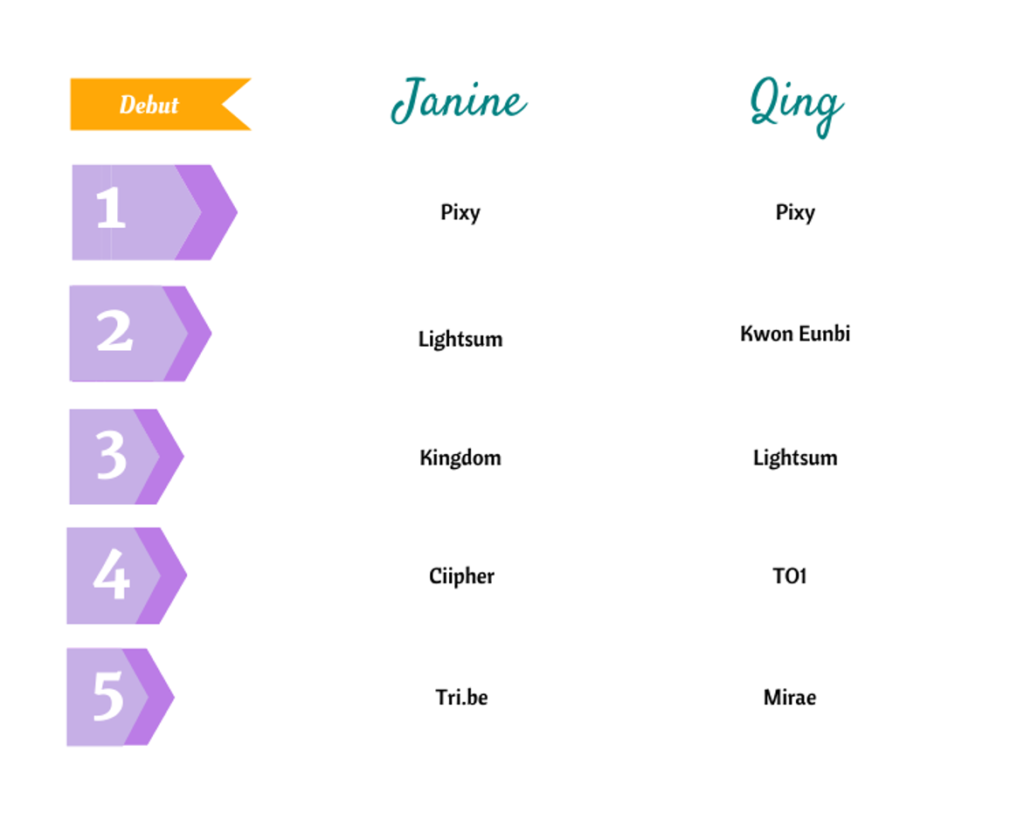
Janine: I thought I was imagining it, but a quick look at the debuts of previous years confirmed that there were significantly fewer debuts than usual. Where normally, I might have about 30 groups and a similar number of soloists to consider, this year that number was almost halved. Of the debuting soloists, the vast majority belong to already-debuted groups.
I can only guess the business decisions that have led to this moment are heavily affected by the pandemic — it doesn’t make sense to try out new groups on a world-weary audience that seems to be seeking nostalgic familiarity. The 2020 rookies with industry backing and media attention seem to have performed well, but from an outside perspective, it doesn’t seem like companies are willing to take a chance on some new faces.
The groups I have been interested in this year seem to be the result of a lot of effort on the part of their agencies. While the number is few, they are rich with interesting characters, music, and concepts. The group that tops both of our lists is Pixy. They drew me in with their strong choreography and performance, as well as their spooky concept which (as it has other reviewers) reminded me of Dreamcatcher.
Pixy is my favourite debut of the year just because they maintained the strength of their performance through their “Addicted” comeback. I like the fact that the group is sticking with their theatrical dark concept-style and displaying their unique choreography.
The progression of their costuming and hair choices are also interesting to watch. I think this is one of the fastest switches from minidresses to fancy suits that I have seen and I love it. The live performances of “Addicted” are gripping and the members look incredible in their different custom outfits.
What made Pixy your favourite debut act of this year, Qing?
Qing: Because not all debuting groups have had the chance to release a follow-up, I based my list on their debuts alone. Pixy kept their top spot on my mid-year review list, a testament to the allure of their dark concept and their solid delivery of it.
Despite VIXX‘s and Dreamcatcher’s successes with it, a darker horror-inspired concept still isn’t very popular. Most artists go the route of camp, such as Sunmi‘s “You Can’t Sit with Us“, Red Velvet‘s “Peek-A-Boo“, and Shinee‘s “Married to the Music“. As such, Pixy’s take still feels fresh, and it also gives us a clear indication of their future artistic direction.
The power of their debut also comes from the music. The song may contain over-used trap elements, but it knows how to manipulate contrasts in volume and tone to create thrill, and also very importantly, showcase the group’s powerful vocals.
That said, the “Wings” choreography is undoubtedly the centrepiece of their debut. Some of its strengths include memorable point moves anchored in the motif of wings, fluid formations, and a willingness to play around with height and speed. It’s hardly a surprise that it trumped dances from other veteran acts to take second place on our mid-year review dance list.
The dance for “Vanilla” contributed to Lightsum‘s place on my list as well. What about the group caught your attention?
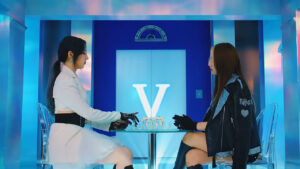
Janine: Dance and performance elements have formed a big part of what has made debut acts memorable for me this year. Lightsum’s high energy and high stepping choreography elevated “Vanilla” from another cheery but generic food-themed track to something really fun and infectious.
“Vivace” continued to mark them as a group with strong performance ability, particularly when delivering these lively and refreshing songs. Lightsum has managed to create a very distinct impression within a short period. Both of the group’s comebacks have been infused with a dynamic energy that I can’t wait to see more of. With the world burning around us, Lightsum is a delightful distraction.
The performance abilities of another girl-group caught my attention: Tri.be. The conventional trap sound of their debut effort was not as arresting as some of the content you’d find upon deeper inspection. I was impressed by the decision to upload practice videos with dancing and live vocals, as well as the sheer number of dance covers the members have done.
I found the group activities intriguing, and I’ll be keeping an open mind while listening for more of their work. Veni Vidi Vici has a few gems that make me interested in hearing more from Tri.Be. Tracks like “True” and “LOBO” allow the members to show off their unique voices. I hope their title tracks will make a stronger impression on me over time.
The dance and performance ability of TO1 can’t be overstated. Would you say that was a big part of why they made it onto your list, Qing?
Qing: Definitely. Despite a very uninspiring concept, especially for a re-debut, TO1 benefited from a solidly produced song and dynamic choreography. These allow them to fully showcase the performance skills they honed on Road to Kingdom. The song gracefully blends the members’ sleek, seductive vocal tones with an energetic beat. The production creates momentum without losing its clean layers. As a result, the song is groovy yet self-assured, and easily exudes a mid-career “you know you love me” air, rather than a try-hard vibe that debuts sometimes carry.
The choreographer confidently plays with different levels and formations. TO1 crouch, kneel, bend, and jump, and they dance in pairs and as a group. The dance in the chorus alternates swift movements with slow ones to introduce an element of sensuality that matches the vocals.
“Son of Beast” is a great example of good production that allows a debuting group to properly showcase their abilities. This is more important than having an original, memorable concept that isn’t executed that well in its performative aspects.
Lightsum placed high on my list for this reason as well, although their cheerful concept is a path well-trodden. What “Vanilla” lacks in originality, it makes up for in energy. I love that it’s so happy without ever needing aegyo. The song delivers a shot of pure pop, and it is a rare gem amidst a sea of hard-hitting, mostly-chanted, barely-sung title tracks accompanying girl crush groups. The choreography for “Vanilla” is also varied, from energetic stomps to fun waving that matches the seaside mood that the drums evoke.
Unlike the upbeat offerings of Tri.be and Lightsum, Ciipher has a decidedly more laid-back sound. Were you drawn in by their music?
Janine: Ciipher’s mid-tempo, deceptively simple and upbeat sound is a big part of the group’s appeal. I found their debut effort pretty straightforward, but their follow-up efforts showed how appealing they can be. “Blind” and some of their b-sides have definitely shown the strengths of the team.
I’m a big believer in the power of synths, and some of the strongest Ciipher tracks show these powers to their full effect. They have a refreshing, energetic quality that really shows in certain places. There is still space to grow–“I Like You” had vocal distortion effects that I’m not keen on, but I like the playful approach to production they seem to be taking. Their initial effort was uneven–the choice to process the members’ vocals to make them less unique was a misstep–but I see it as an indication of a willingness to take risks. Songs like “Solo” and “Blind” remind me of groups like Snuper and early Golden Child in a great way.
Ciipher’s rap line is one of its secret weapons, with members Tag, Keita, and Won already putting out interesting covers and self-composed songs. Mirae’s debut has a decidedly hip hop sensibility. What drew you to their style?
Qing: Mirae don’t have the strongest style, unlike Ciipher’s well-produced sophomore release, but their debut concept was more clearly defined. The futuristic, sci-fi aesthetic of “Killa” provides a clear direction for the group’s visual and sonic identity, but it’s also not overly limiting, a balance that Pixy’s nightmarish niche shares.
“Killa”‘s funky, early-VIXX-meets-NCT style is also a welcome take on recent heavy-hitting hip hop sounds that younger groups lean towards. Unfortunately, the verses are weaker than the chorus, and the choreography was also more standard fare, so they limit Mirae’s ability to fully showcase their skill. For this reason, I placed them lower on my list.
Kingdom are similar to Mirae in that they had a distinct concept—one that draws from the Arthurian legends—from the outset. What were some of their strengths?
Janine: I wonder if, as an old Starlight, I am missing VIXX’s engrossing, mythological concepts, and that has been a contributing factor to me being drawn to Kingdom. The complex backstory woven through the group’s comebacks contributes to how memorable they have been this year. The worldbuilding they have invested in is a risk that has paid off. Deciding to dedicate, as of now, three separate albums to this epic sound and aesthetic is an interesting move, and hearing how they have supported each concept musically has kept me curious.
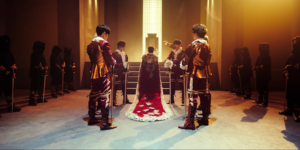
The choral elements on History of Kingdom: Part I. Arthur, orchestral strings on History of Kingdom: Part II. Chiwoo , and dark theatrical production on History of Kingdom: Part III. Ivan show that the team is interested in maintaining a musical link to the concept. It is exciting to think about how the concept will be further built upon. Kingdom ranked in the middle of my list because without the full package of rich lore, parallel dimensions, and dramatic visuals, I’m not sure I would be as invested. That being said, I am excited to experience how their story will unfold.
You chose the only soloist on our lists–what drew you to Kwon Eunbi?
Qing: We’re certainly seeing a renaissance of VIXX-style theatricality in the offerings from groups Kingdom and Oneus, and it makes me excited for K-pop in 2022. In “Door”, Eunbi draws from a different performance legacy–swing, a style of jazz that, like so many popular genres today, have roots in Black culture.
The number opens with a bit of scat singing and buoyants horns which give way to funky, plucked synths. The jazzy sound allows Eunbi’s voice to stand out immediately, and she navigates high notes and low, conspiratorial whispers with the ease of an experienced singer.
Like the music, the visuals are bright and fun, lightly referencing Alice in Wonderland. Some of the styling draws inspiration from Motown glamour; Eunbi’s gold beaded dress is particularly reminiscent of the fashion of The Supremes. The MV deftly balances playful and sexy qualities without infantilising or objectifying Eunbi.
The main weak link in the debut is the choreography. The swing elements are a nice touch, but the dance could have leaned more into the restless energy of the song, or made room for more showmanship flourishes that Eunbi is doubtless capable of.
Despite having room for improvement, “Door” is a very intriguing and appropriate introduction to Eunbi as an artist. With the right direction from Woollim Entertainment, I have a feeling that she can enter the league of Chungha, IU, and Sunmi.
Janine: Although we had fewer debuts this year, they haven’t been lesser in quality. We’ve seen profound concepts, strong performances, and interesting musical decisions.
There are groups and soloists that didn’t make my list that I am still going to be keeping an eye on. Xdinary Heroes, Billlie, former Big Hit Music songwriter Adora, and Hanse, who have made their mark towards the end of the year, are just some of the names I will be listening to in the coming months. It’s been a tough time for the entertainment industry, but there is still hope yet.
(YouTube [1][2][3][4][5][6][7][8][9]. Images via AllArt Entertainment, GF Entertainment)
